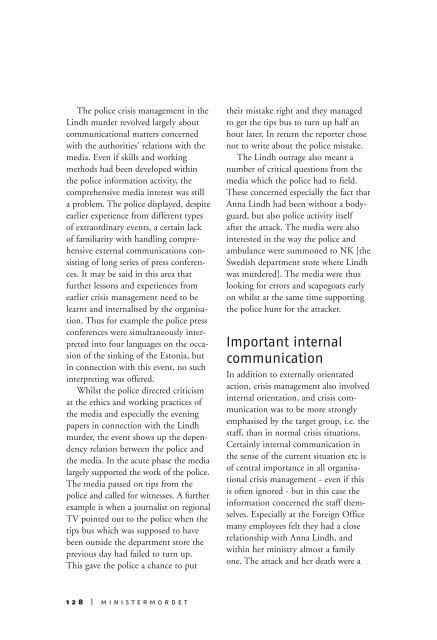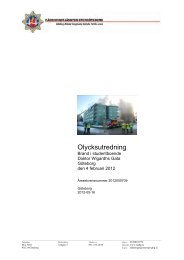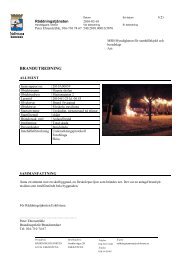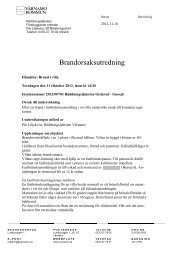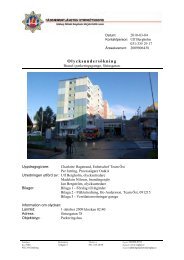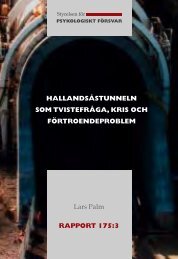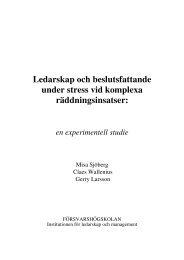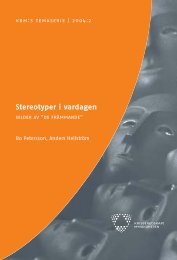Ministermordet - RIB Bibliotek
Ministermordet - RIB Bibliotek
Ministermordet - RIB Bibliotek
You also want an ePaper? Increase the reach of your titles
YUMPU automatically turns print PDFs into web optimized ePapers that Google loves.
The police crisis management in the<br />
Lindh murder revolved largely about<br />
communicational matters concerned<br />
with the authorities' relations with the<br />
media. Even if skills and working<br />
methods had been developed within<br />
the police information activity, the<br />
comprehensive media interest was still<br />
a problem. The police displayed, despite<br />
earlier experience from different types<br />
of extraordinary events, a certain lack<br />
of familiarity with handling comprehensive<br />
external communications consisting<br />
of long series of press conferences.<br />
It may be said in this area that<br />
further lessons and experiences from<br />
earlier crisis management need to be<br />
learnt and internalised by the organisation.<br />
Thus for example the police press<br />
conferences were simultaneously interpreted<br />
into four languages on the occasion<br />
of the sinking of the Estonia, but<br />
in connection with this event, no such<br />
interpreting was offered.<br />
Whilst the police directed criticism<br />
at the ethics and working practices of<br />
the media and especially the evening<br />
papers in connection with the Lindh<br />
murder, the event shows up the dependency<br />
relation between the police and<br />
the media. In the acute phase the media<br />
largely supported the work of the police.<br />
The media passed on tips from the<br />
police and called for witnesses. A further<br />
example is when a journalist on regional<br />
TV pointed out to the police when the<br />
tips bus which was supposed to have<br />
been outside the department store the<br />
previous day had failed to turn up.<br />
This gave the police a chance to put<br />
their mistake right and they managed<br />
to get the tips bus to turn up half an<br />
hour later. In return the reporter chose<br />
not to write about the police mistake.<br />
The Lindh outrage also meant a<br />
number of critical questions from the<br />
media which the police had to field.<br />
These concerned especially the fact that<br />
Anna Lindh had been without a bodyguard,<br />
but also police activity itself<br />
after the attack. The media were also<br />
interested in the way the police and<br />
ambulance were summoned to NK [the<br />
Swedish department store where Lindh<br />
was murdered]. The media were thus<br />
looking for errors and scapegoats early<br />
on whilst at the same time supporting<br />
the police hunt for the attacker.<br />
Important internal<br />
communication<br />
In addition to externally orientated<br />
action, crisis management also involved<br />
internal orientation, and crisis communication<br />
was to be more strongly<br />
emphasised by the target group, i.e. the<br />
staff, than in normal crisis situations.<br />
Certainly internal communication in<br />
the sense of the current situation etc is<br />
of central importance in all organisational<br />
crisis management - even if this<br />
is often ignored - but in this case the<br />
information concerned the staff themselves.<br />
Especially at the Foreign Office<br />
many employees felt they had a close<br />
relationship with Anna Lindh, and<br />
within her ministry almost a family<br />
one. The attack and her death were a<br />
128 | ministermordet


